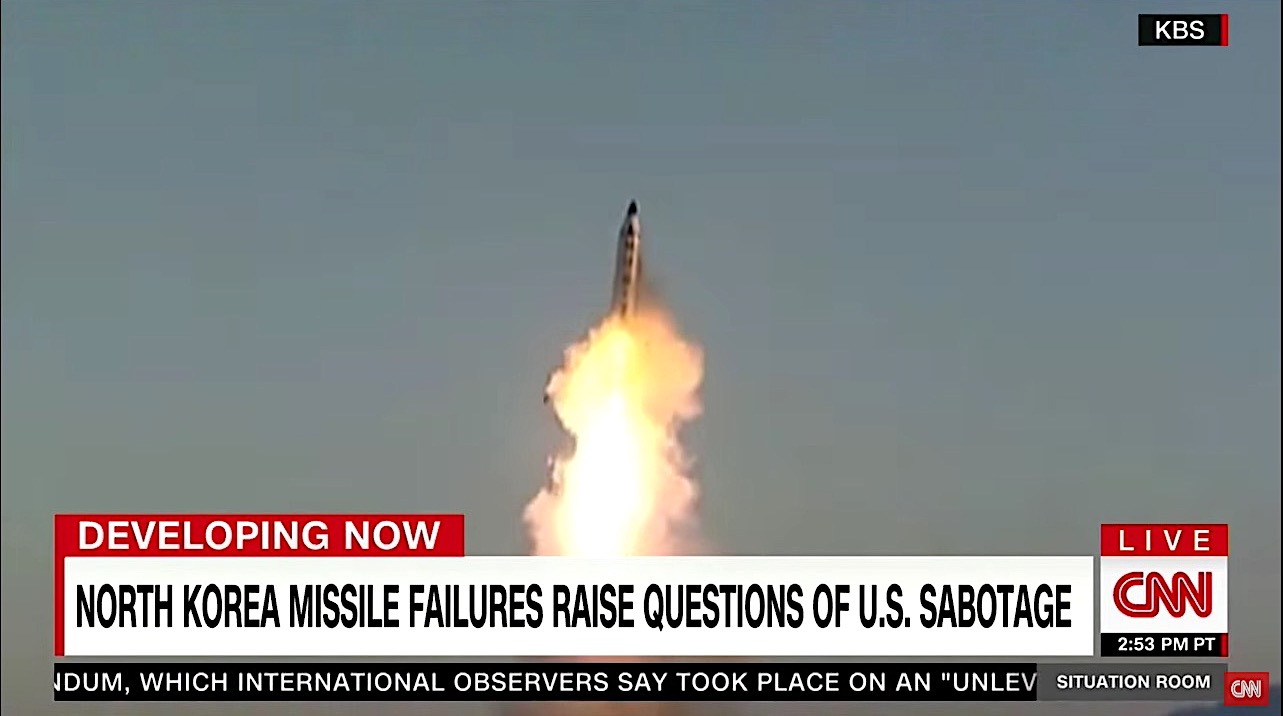America may be sabotaging North Korea's missiles


A free daily email with the biggest news stories of the day – and the best features from TheWeek.com
You are now subscribed
Your newsletter sign-up was successful
After a North Korean missile exploded seconds after launch on Sunday, Vice President Mike Pence declined to confirm or deny if the U.S. had sabotaged the missile test. "I really can't comment on the electronic and technical capabilities of our military," he told CNN on Wednesday aboard the USS Ronald Reagan in Japan. But the U.S. has been ramping up its efforts to disrupt North Korea's missile program through cyber and electronic means since 2014, when former President Barack Obama decided other anti-missile systems weren't a sufficient defense, The New York Times reported last month.
The goal of the covert program is to sabotage missiles so they explode seconds after launch, and North Korean military rockets have been regularly exploding, veering off course, and plunging into the sea since soon after Obama ordered the disruption efforts. Medium-range Musudan missiles, for example, have a failure rate of 88 percent, The New York Times says. There are several ways the U.S. might sabotage Pyongyang's missile program, experts say. "You could either go after the supply chain, embedding flaws in parts and systems that they are using," Peter Singer, a fellow at New America, told CNN. Other possible tactics include hacking the electronics to mess with the launch sequence or trigger the self-destruct mechanism. CNN's Brian Todd lays out the case for U.S. sabotage:
It is also possible that North Korea is just suffering technical difficulties, human error, sabotage by disgruntled North Koreans, or flawed designs. But last fall, North Korean leader Kim Jong Un "was widely reported to have ordered an investigation into whether the United States was sabotaging North Korea's launches," the Times reported in early March, "and over the past week he has executed senior security officials."
The Week
Escape your echo chamber. Get the facts behind the news, plus analysis from multiple perspectives.

Sign up for The Week's Free Newsletters
From our morning news briefing to a weekly Good News Newsletter, get the best of The Week delivered directly to your inbox.
From our morning news briefing to a weekly Good News Newsletter, get the best of The Week delivered directly to your inbox.
A free daily email with the biggest news stories of the day – and the best features from TheWeek.com
Peter has worked as a news and culture writer and editor at The Week since the site's launch in 2008. He covers politics, world affairs, religion and cultural currents. His journalism career began as a copy editor at a financial newswire and has included editorial positions at The New York Times Magazine, Facts on File, and Oregon State University.
-
 The ‘ravenous’ demand for Cornish minerals
The ‘ravenous’ demand for Cornish mineralsUnder the Radar Growing need for critical minerals to power tech has intensified ‘appetite’ for lithium, which could be a ‘huge boon’ for local economy
-
 Why are election experts taking Trump’s midterm threats seriously?
Why are election experts taking Trump’s midterm threats seriously?IN THE SPOTLIGHT As the president muses about polling place deployments and a centralized electoral system aimed at one-party control, lawmakers are taking this administration at its word
-
 ‘Restaurateurs have become millionaires’
‘Restaurateurs have become millionaires’Instant Opinion Opinion, comment and editorials of the day
-
 British warship repels 'largest Houthi attack to date' in the Red Sea
British warship repels 'largest Houthi attack to date' in the Red SeaSpeed read Western allies warn of military response to Iranian-backed Yemeni rebels if attacks on ships continue
-
 Houthi rebels claim Red Sea ship attacks
Houthi rebels claim Red Sea ship attacksspeed read Iran-backed Yemeni group vows to escalate aggression towards Israel-linked vessels in revenge for Gaza war
-
 Israel plans next phase of Gaza war as first hostages released
Israel plans next phase of Gaza war as first hostages releasedSpeed read After four-day ceasefire 'we will not stop' until destruction of Hamas, says Israel
-
 Mob storms Russian airport 'looking for Jews'
Mob storms Russian airport 'looking for Jews'Speed Read Plane from Israel surrounded by rioters chanting antisemitic slogans after landing in Russia's Dagestan region
-
 Tuberville's military promotions block is upending lives, combat readiness, 3 military branch chiefs say
Tuberville's military promotions block is upending lives, combat readiness, 3 military branch chiefs saySpeed Read
-
 Ukraine's counteroffensive is making incremental gains. Does it matter in the broader war?
Ukraine's counteroffensive is making incremental gains. Does it matter in the broader war?Speed Read
-
 US commissions first-ever Navy ship in a foreign port
US commissions first-ever Navy ship in a foreign portSpeed Read
-
 British spy chief, Wagner video suggest Prigozhin is alive and freely 'floating around'
British spy chief, Wagner video suggest Prigozhin is alive and freely 'floating around'Speed Read
